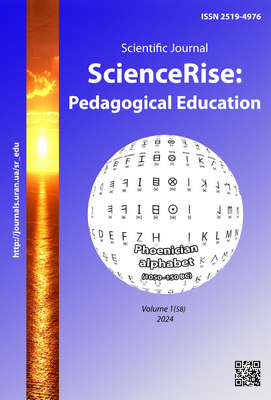Становлення та розвиток системи підготовки логопедичних кадрів (кінець XIX ст. – поч. XXI ст)
DOI:
https://doi.org/10.15587/2519-4984.2024.298564Ключові слова:
спеціальна освіта, історія логопедії, порушення мовлення, підготовка кадрів, логопедАнотація
Підготовка майбутніх логопедів у сучасному освітньому просторі визначається процесами в соціокультурному середовищі, соціокультурними трансформаціями в суспільстві, змінами в ментальності сучасної людини та підвищенням вимог до якості професійної підготовки висококваліфікованих фахівців. Необхідність удосконалення підготовки логопедів у сучасних умовах випливає з певних протиріч. Це включає розбіжності між вимогами другого покоління державних освітніх стандартів щодо комп'ютеризації праці вчителів та використання інформаційних ресурсів, а також реальним станом освітньої системи. Додатково, існує проблема зростаючої кількості дітей із мовленнєвими порушеннями, часто ускладненими вторинними розладами. Глибоке історичне вивчення розвитку підготовки логопедичних кадрів є ключовим для розуміння та вдосконалення сучасних освітніх процесів. Це дозволяє не лише оцінити зміни, що відбулися в цій сфері, але й врахувати соціально-економічні, культурні та технологічні фактори, які формують потреби та напрямки розвитку логопедії в майбутньому.
У статті висвітлено історію становлення і розвитку вітчизняної системи логопедичної освіти. Розкрито розвиток логопедичної освіти, що пов’язано з соціально-економічним устроєм країни, світовим історико-педагогічним процесом, рівнем розвитку дефектологічної науки як інтегрованої галузі знання на стику медицини, психології, педагогіки в усі історичні періоди.
Аналіз наукової літератури дозволив визначити деякі загальні умови модернізації логопедичної освіти, підтвердивши, що на основі поглибленого вивчення змісту і сутності проблеми формування професіоналізму та професійної компетентності майбутніх логопедів можлива розробка організаційно-методичного забезпечення їх розвитку та впровадження в освітню і виробничу практику відповідно до соціально-економічних умов.
Ця стаття підкреслює важливість глибокого аналізу історичних та сучасних аспектів у підготовці логопедів, враховуючи соціокультурні зміни та технологічний розвиток. Розуміння історії та поточного стану логопедичної освіти є ключовим для ефективної модернізації підготовки фахівців, що відповідає сучасним викликам та потребам суспільства
Посилання
- Bondar, V. I. (2004). Osvita ditei z osoblyvymy potrebamy: poshuky ta perspektyvy. Suchasni tendentsii rozvytku spetsialnoi osvity. Kyiv, 3–12.
- Chupakhina, S.; Babych, M. M. (Ed.) (2019). Methodological bases for digital competence formation of future teachers under conditions of inclusive education: Ukrainian content. Modern World tendencies in the development of science. Vol. 2. London: Published by Sciemcee Publishing, 26–40.
- Berehova, M. I. (2019). Dydaktyko-praktychna pidhotovka maibutnikh korektsiinykh pedahohiv do roboty v umovakh osvitnoho inkliuzyvnoho prostoru. Kyiv, 40. Available at: https://repository.ldufk.edu.ua/bitstream/34606048/26497/1/%d0%91%d0%b5%d1%80%d0%b5%d0%b3%d0%be%d0%b2%d0%b0_avtoref_2019.pdf
- Potapenko, O. M. (2010). Teoriia i praktyka pidhotovky lohopedychnykh kadriv v Ukraini (druha polovyna XX stolittia). Kyiv, 341.
- Sharma, M. (2016). Innovative roles of guidance and counseling for managing children with learning disabilities in inclusive classroom by inclusive teachers. International Journal of Research in Social Sciences, 6 (12), 556–567. Available at: https://www.indianjournals.com/ijor.aspx?target=ijor:ijrss&volume=6&issue=12&article=043&type=pdf
- Bridges, DianeR., Davidson, R. A., Soule Odegard, P., Maki, I. V., Tomkowiak, J. (2011). Interprofessional collaboration: three best practice models of interprofessional education. Medical Education Online, 16 (1), 6035. https://doi.org/10.3402/meo.v16i0.6035
- Malyshevska, I. A. (2018).Teoretyko-metodychni osnovy pidhotovky fakhivtsiv psykholoho-pedahohichnoho profiliu do roboty v umovakh inkliuzyvnoho osvitnoho seredovyshcha. Uman: Vydavets «Sochinskyi M. M.», 386.
- American Speech-Language-Hearing Association: Scope of practice in speech-language pathology [Service Delivery Areas] (2016). Available at: https://www.asha.org/policy/sp2016-00343/
- Sheremet, M. K., Potapenko, O. M. (2009). Stan systemy pidhotovky lohopediv u vyshchykh navchalnykh zakladakh Ukrainy (80-ti roky XX stolittia). Zbirnyk naukovykh prats Kam′ianets-Podilskoho natsionalnoho universytetu imeni Ivana Ohiienka. Seriia: sotsialno-pedahohichna, 12, 362–367. Available at: https://enpuir.npu.edu.ua/bitstream/handle/123456789/35882/100066293.pdf?sequence=1
- Sheremet, M. K. (2011). Pidhotovka korektsiinykh pedahohiv u vyshchykh navchalnykh zakladakh Ukrainy. Zbirnyk naukovykh prats Kamianets-Podilskoho natsionalnoho universytetu imeni Ivana Ohiienka. Seriia: Sotsialno-pedahohichna, 17 (1), 7–11. Available at: http://nbuv.gov.ua/UJRN/znpkp_sp_2011_17%281%29__3
- Myronova S. P. (2016). Realities and prospects of staffing inclusive education. Naukovyi chasopys Natsionalnoho pedahohichnoho universytetu imeni M. P. Drahomanova. Seriia 19: Korektsiina pedahohika ta spetsialna psykholohiia, 32 (2), 5–10. Available at: http://nbuv.gov.ua/UJRN/Nchnpu_019_2016_32%282%29__3
- Maksymiv, Y., Chupakhina, S. (2018). Peculiarities of becoming personal and professional qualities of future teacher-speech therapists. Educational space of Ukraine, 13, 66–76. https://doi.org/10.15330/esu.13.66-76
- Martynchuk O. V. (2018). Pidhotovka fakhivtsiv zi spetsialnoi osvity do profesiinoi diialnosti v inkliuzyvnomu osvitnomu seredovyshchi. Kyiv: Tsentr uchbovoi literatury, 430. Available at: https://elibrary.kubg.edu.ua/id/eprint/24867
- Shevchenko, V. M. (2017). Modern trends in the development of special education in Ukraine and Poland. Naukovyi chasopys Natsionalnoho pedahohichnoho universytetu imeni M. P. Drahomanova. Seriia 19: Korektsiina pedahohika ta spetsialna psykholohiia, 34, 107–112. Available at: http://nbuv.gov.ua/UJRN/Nchnpu_019_2017_34_20
- Leniv, Z. (2018). Cognitive-competence component of teaching assistants readiness to professional activities in inclusive space. Obrii, 2 (47), 57–61. Available at: http://nbuv.gov.ua/UJRN/obrii_2018_2_16
- Savinova, N. V. (2014). Contemporary issues and trends in the development of speech therapy as a science. Naukovyi chasopys NPU imeni M. P. Drahomanova. Seriia 19: Korektsiina pedahohika ta spetsialna psykholohiia, 27, 184–188. Available at: http://nbuv.gov.ua/UJRN/Nchnpu_019_2014_27_40
- Maksymchuk, B., Sarancha, I., Husak, A., Avramenko, O., Kuzmenko, I., Kuzmenko, V. et al. (2022). Implementing the Course “Human Rights” for Children with Special Needs under the Changed Socio-Educational Conditions. Revista Romaneasca Pentru Educatie Multidimensionala, 14 (3), 428–443. https://doi.org/10.18662/rrem/14.3/617
##submission.downloads##
Опубліковано
Як цитувати
Номер
Розділ
Ліцензія
Авторське право (c) 2024 Yevheniia Lyndinа

Ця робота ліцензується відповідно до Creative Commons Attribution 4.0 International License.
Наше видання використовує положення про авторські права Creative Commons CC BY для журналів відкритого доступу.
Автори, які публікуються у цьому журналі, погоджуються з наступними умовами:
1. Автори залишають за собою право на авторство своєї роботи та передають журналу право першої публікації цієї роботи на умовах ліцензії Creative Commons CC BY, котра дозволяє іншим особам вільно розповсюджувати опубліковану роботу з обов'язковим посиланням на авторів оригінальної роботи та першу публікацію роботи у цьому журналі.
2. Автори мають право укладати самостійні додаткові угоди щодо неексклюзивного розповсюдження роботи у тому вигляді, в якому вона була опублікована цим журналом (наприклад, розміщувати роботу в електронному сховищі установи або публікувати у складі монографії), за умови збереження посилання на першу публікацію роботи у цьому журналі.








